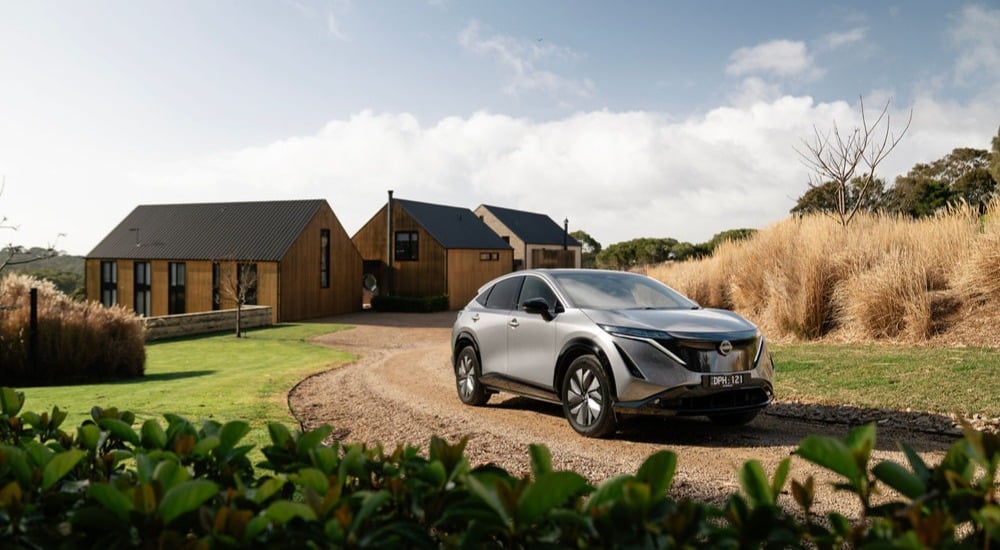Car review: 2025 Nissan Ariya

Chinese brands are on track to dominate the affordable end of the Australian new-car market, EVs and potentially even hybrids. Now, they’re coming for your ute.
It must’ve been difficult for fans of the Nissan Leaf to watch this original EV go from being an almost classless vehicle with bulletproof resale to a mere also-ran, swamped by the Tesla phenomenon and recent global competition.
Nissan provided a taste of its next-generation EV strategy when it revealed the Ariya medium-sized crossover in July 2020 debuting new architecture, a futuristic styling direction and a Japanese-minimalist interior to win over EV fans.
COVID-19 threw a spanner in the works, delaying production for 18 months. Now, almost four years later, the Ariya is finally in Australia. So why the drawn-out arrival time? And given it’s no longer a spring chicken, does the Ariya have the EV tech to make an impact in 2025?
Nissan Australia claims that right now is the sweet spot to introduce Ariya, filling the brand’s empty EV niche before an all-new, third-generation Leaf joins the fold in late 2026. There’s plenty to like about the Ariya, particularly its interior.
Features
The exterior features large wheels (19 and 20-inch) and interesting colours (the no-cost base paint is deep aurora green). Inside there’s Japanese ‘Kumiko’ patterns for the speaker grilles and ‘Andon’ ambient lighting panels intended to evoke Japanese lanterns.
In the flagship Ariya Evolve, there’s also petrol-blue Nappa leather upholstery with stitched patterns, as well as a padded blue suede material that spans the dashboard and blends into the entire length of the cabin sides. It’s warm, tactile and beautifully stitched, helping showcase Ariya’s build quality.
All variants have supportive, height-adjustable front seats, though only the Evolve scores both seat heating and cooling. It also has a heated rear seat in the outboard positions, though the Ariya’s rear passengers don’t enjoy sumptuous comfort like the front occupants.

On the road
On the road, the Ariya is consistently likeable. Its steering changes direction keenly without being too sharp, and it feels solidly weighted without being too heavy. Unlike some other EVs, the steering avoids being too light and artificial
The Ariya handles with poise and precision, making it easy to tackle twisty roads, and its on-the-move performance is effortlessly brisk. If only the front-wheel-drive versions (the Engage, Advance and Advance+) weren’t so lazy when accelerating at the traffic lights.
Unfortunately, the Ariya could ride more comfortably. Its suspension avoids dropping loudly into large potholes but it never properly settles, fidgeting around on the road.
Where Nissan’s new EV loses more of its lustre is in the pricing department, especially in comparison to other similar small-battery variants.
The entry-level Ariya Engage ($55,840 before on-road costs) and next-up Ariya Advance ($59,840) each have a 63kWh battery, meaning a 385km range, plus a mediocre 10 to 80 percent charging time of 35 minutes.
While real-world testing indicates Nissan’s range numbers are potentially conservative, the reality is a Tesla Model Y rear-wheel-drive offers 466km range for $58,900, as well as faster charging and far-superior performance.
The big-battery 87kWh Ariya Advance+ brings a more palatable 504km range for $63,840 (though it takes 40 minutes for a 10 to 80 percent charge). The dual-motor Ariya Evolve priced at $71,840 introduces Nissan’s ‘e-4orce’ electric All-wheel drive technology as well as 290kW/600Nm powertrain outputs.

A final word
While the Ariya is a competent, well-built and supported EV offering a 10-year/300,000km warranty and 10 years of roadside assistance if you service it within the Nissan dealer network, it’s this ownership aspect, rather than the excellence of the product, that its success hinges upon.
Aside from the ease of its control layout and the refinement of its driving character, the Ariya is just another EV. And unless its pricing becomes drive-away in the very near future, I suspect this new electric Nissan will be a rare sight on Australian roads.
| Specs | |
|---|---|
| Price | $55,840 to $71,840 |
| ANCAP safety rating | 5 stars (tested 2022) |
| Warranty | Five years/unlimited kilometres or 10 years/300,000km if serviced with Nissan; Eight years/160,000km battery warranty; 12 months’ roadside assistance or 10 years/300,000km if serviced with Nissan; five-year/100,000km service plan ($1495). |
| Range (WLTP) | 385km (Engage, Advance), 487km (Evolve), 504km (Advance+) |
Do you need car advice?
RAA members can call our free Car Advice service.
Or call 8202 4689

